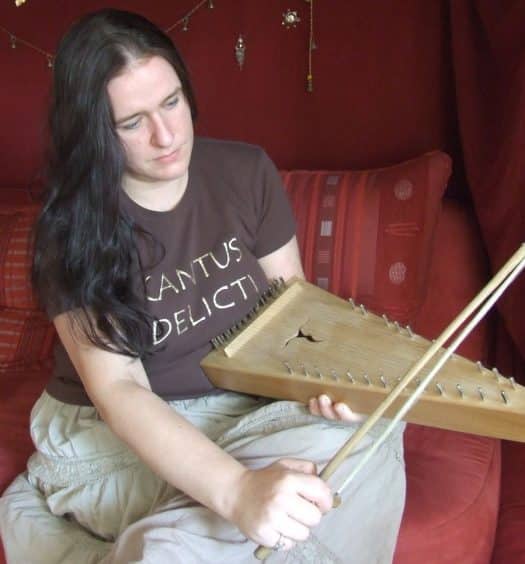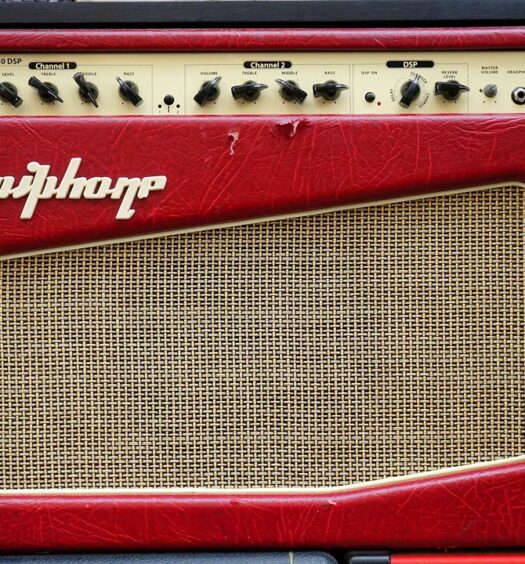The psaltery is mentioned many times in the Bible. This stringed instrument is translated from the Hebrew nebel or nabel. Occasionally, this has been translated as viol or lute but all three instruments are distinctive. The viol is a guitar with six strings. The lute is larger and has a convex back and has a superior tone.
The Psaltery
The word psaltery itself derives from the Greek psalterion/psalterium. It is an instrument that’s played using the fingers rather than using a plectrum or a quill.
Webster’s Dictionary defines psaltery as “An instrument of music used by the Hebrews, the form of which is not now known. That which is now used is a flat instrument in form of a trapezium or triangle truncated at the top. In addition, it is strung with thirteen chords of wire, mounted on two bridges at the sides, and struck with a plectrum or crooked stick.”
For example, in Psalm 33.2 of the King James Bible we see “Praise the Lord with harp; sing to him with the psaltery, and an instrument of ten strings.” This occurrence of the word psaltery is the first mention of any musical instruments in the whole of the Psalms. Interestingly, the early preachers would protest against the use of musical instruments in churches, just like the Eastern churches continue to do so.
It’s somewhat impossible to say exactly what the Hebrew nebel corresponded to. We know that David’s psalteries were constructed from cypress while Solomon’s were of algum.
Sections of the Bible where the Psaltery is Mentioned
Different versions of the Bible translate the words psaltery in different ways. The King James Bible is one of the versions that uses the word ‘psaltery’ more than others. But there are other occurrences where the King James Bible translates the word as ‘stringed instrument’ while others use psaltery. For example, in Amos 5:23 when Young’s Literal Translation says “Turn aside from Me the noise of thy songs, Yea, the praise of thy psaltery I hear not.” But the King James Bible says “Take thou away from me the noise of thy songs; for I will not hear the melody of thy viols.”
The following quotations are from the King James Bible.
Samuel 10:5
“After that thou shalt come to the hill of God, where is the garrison of the Philistines: and it shall come to pass, when thou art come thither to the city, that thou shalt meet a company of prophets coming down from the high place with a psaltery, and a tabret, and a pipe, and a harp, before them; and they shall prophesy”
Psalm 33:2
“Praise the LORD with harp: sing unto him with the psaltery and an instrument of ten strings.“
Psalm 57:8
“Awake up, my glory; awake, psaltery and harp: I myself will awake early.“
Psalm 71:22
“I will also praise thee with the psaltery, even thy truth, O my God: unto thee will I sing with the harp, O thou Holy One of Israel.“
Daniel 3:5
“That at what time ye hear the sound of the cornet, flute, harp, sackbut, psaltery, dulcimer, and all kinds of musick, ye fall down and worship the golden image that Nebuchadnezzar the king hath set up.”
Daniel 3:10
“Thou, O king, hast made a decree, that every man that shall hear the sound of the cornet, flute, harp, sackbut, psaltery, and dulcimer, and all kinds of musick, shall fall down and worship the golden image.“
Final Words
It’s impossible to say what the Bible is referring to with its use of the word psalteries and other similar words. What is clear, however, is that psalteries did exist in biblical times in some form or other.
To learn more about modern day psalteries, check out our review on the best psalteries.




